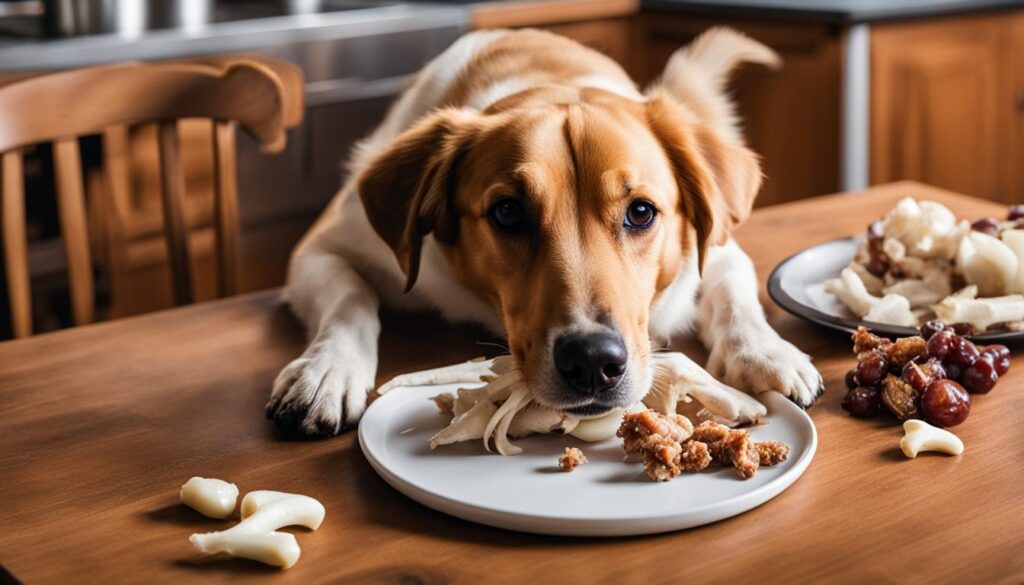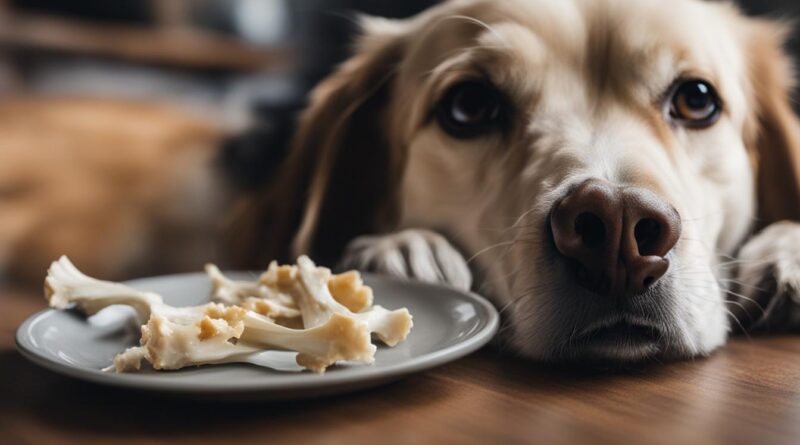Dog Ate Chicken Bones? Immediate Actions to Take
When your beloved furry friend ingests chicken bones, it can be a worrisome situation that requires immediate attention. The risks associated with dogs consuming chicken bones can range from mild discomfort to severe health complications.
It’s crucial to know what steps to take when faced with this situation. By following the right actions, you can ensure your dog’s safety and well-being as quickly as possible.
In this article, we will discuss what to do if your dog eats chicken bones, the dangers of cooked chicken bones, preventive measures, and key takeaways to help you navigate this potentially hazardous scenario with confidence.
Key Takeaways:
- Immediate action is essential if your dog ingests chicken bones to reduce potential health risks.
- Cooked chicken bones are particularly dangerous as they can splinter and cause serious harm to your dog’s digestive system.
- Contact your veterinarian promptly for guidance and professional advice.
- Remember to stay calm and monitor your dog’s behavior after they have consumed chicken bones.
- Prevention plays a vital role in protecting your dog from ingesting chicken bones, so be proactive in managing their environment and providing suitable chew toys.
The Dangers of Cooked Chicken Bones
When it comes to feeding our furry friends, it’s essential to be aware of the potential dangers that certain foods can pose to their health. One such concern is the consumption of cooked chicken bones. Unlike raw bones, cooked bones carry a higher risk for dogs and can lead to serious complications.
Unlike raw bones that are harder and more resistant, cooked bones are softer and prone to splintering. When dogs chew on cooked chicken bones, these splintered pieces can pose numerous risks, potentially causing internal injuries or blockages. The fragments can be sharp and jagged, leading to lacerations in the mouth, throat, and digestive tract.
“The sharp shards of cooked chicken bones can cause tears and punctures in a dog’s stomach and intestines, leading to severe internal damage,” warns Dr. Rachel Johnson, a renowned veterinarian and canine health expert.
One of the significant dangers associated with cooked chicken bones is the risk of bone obstruction. If a dog swallows a large or sharp piece of bone, it can become lodged in the stomach or intestines, causing a potentially life-threatening blockage. This blockage can prevent the passage of food, leading to discomfort, pain, vomiting, and difficulty defecating.
Signs of Dog Bone Obstruction:
- Loss of appetite
- Absence of bowel movements
- Vomiting or regurgitation
- Abdominal pain or discomfort
- Lethargy or depression
If you notice any of these symptoms or suspect that your dog has ingested cooked chicken bones, it’s crucial to seek immediate veterinary care. Early intervention can help prevent complications and ensure prompt treatment to safeguard your dog’s well-being.
What to Do If Your Dog Eats Chicken Bones
If your dog eats chicken bones, it’s crucial to take immediate action to minimize the potential health risks. Here’s what you should do:
- Stay calm: It can be alarming to see your dog consume chicken bones, but it’s important to stay calm and avoid panicking. Your dog can sense your emotions, and panicking may increase their stress levels.
- Assess the situation: Determine if your dog has swallowed the bone whole or if it has been chewed into smaller pieces. This will help you understand the potential risks and the necessary steps to take.
- Do not induce vomiting: Contrary to popular belief, it’s best not to induce vomiting unless specifically instructed by a veterinarian. Chicken bones can splinter, and vomiting may cause further damage or obstruction.
- Monitor your dog: Keep a close eye on your dog for any signs of distress or discomfort. Watch for symptoms such as excessive drooling, choking, vomiting, diarrhea, or changes in appetite or behavior.
- Contact your veterinarian: Immediately reach out to your veterinarian or an emergency veterinary clinic for professional advice. They will evaluate the situation and provide guidance based on your dog’s specific needs.
- Follow vet advice: Abide by the instructions given by your veterinarian. They may ask you to bring your dog in for a physical examination, X-rays, or other necessary tests to assess any potential complications.
- Provide first aid: If advised by your vet, administer any prescribed first aid measures, such as feeding your dog a small, easily digestible meal to help cushion the bones and prevent further damage.
- Prevent future incidents: Take preventive measures to safeguard your dog from eating bones in the future. This includes ensuring they are supervised during mealtime, keeping bones securely stored or disposed of, and providing safe chew toys as alternatives.
Remember, prompt action and professional guidance are crucial when your dog eats chicken bones. Prioritize their safety and consult a vet to mitigate any potential risks.
How to Prevent Dogs from Eating Chicken Bones
Prevention is key when it comes to avoiding the hazards of dogs eating chicken bones. By taking proactive measures, you can ensure the safety and well-being of your furry friend. Here are some tips to keep in mind:
- Always supervise your dog during mealtime and ensure they are eating their food in a calm and controlled manner.
- Keep all food scraps, including chicken bones, securely stored and out of your dog’s reach. Use sealed containers or dispose of bones in a way that prevents access.
- Avoid giving your dog cooked chicken and other bone-in meats altogether. It’s best to stick to boneless options that won’t pose a risk.
- Train your dog to leave any items they find on walks or in the yard. Teach the “drop it” command and reward them with a treat when they comply.
- Provide your dog with appropriate chew toys and bones designed specifically for dogs. This will satisfy their natural chewing instinct and reduce the temptation to seek out chicken bones.
- If you have multiple dogs, separate them during mealtime to avoid competition and potential bone-related incidents.
Remember, prevention is always better than dealing with the consequences of a dog that has already eaten chicken bones. By implementing these preventive measures, you can ensure a safe and happy environment for your canine companion.

Conclusion
Accidents happen, and if your dog swallows chicken bones, it’s crucial to take immediate actions to ensure their safety. The first step is to stay calm and contact your veterinarian for guidance. They can provide emergency dog care instructions tailored to your dog’s specific situation.
In the meantime, monitor your dog’s behavior closely. Look out for signs of distress such as choking, difficulty breathing, excessive drooling, or vomiting. If any of these symptoms occur, it could indicate a potential dog bone obstruction, and you should seek immediate veterinary assistance.
Prevention is always the best approach. To avoid such incidents in the future, be proactive in managing your dog’s environment. Ensure that chicken bones and other potential hazards are kept out of their reach. Educate yourself and others about the dangers of dogs swallowing chicken bones to create a safe environment for your furry friend.
Remember, when it comes to dog swallowing chicken bones, quick action and preventive measures are crucial. By following these guidelines and reacting promptly, you can mitigate the risks and safeguard your dog’s health and well-being.
FAQ
What should I do if my dog eats chicken bones?
If your dog eats chicken bones, it’s important to take immediate action to minimize the potential health risks. Stay calm and follow these steps:
Why are cooked chicken bones dangerous for dogs?
Cooked chicken bones are especially dangerous for dogs. Unlike raw bones, cooked bones are softer and can easily splinter when chewed on. These splintered bones can pose various risks, including:
What should I do if my dog ingests chicken bones?
If your dog ingests chicken bones, here’s what you should do:
How can I prevent my dog from eating chicken bones?
Prevention is key to avoiding the hazards of dogs eating chicken bones. Here are some tips to keep in mind:
What are the risks of a dog swallowing chicken bones?
The risks of a dog swallowing chicken bones include:

